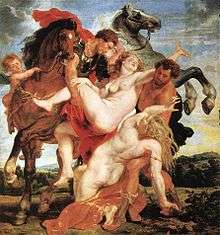Leucippus (mythology)
In Greek mythology, Leucippus (Greek: Λεύκιππος Leukippos) was a name attributed to multiple characters, the most prominent of whom was Leucippus, father of the two Leucippides.
Father of the Leucippides
Roman sarcophagus with Castor and Pollux seizing the daughters of Leucippus, c. 160 CE.
Leucippus, son of Gorgophone and Perieres, was the father of Phoebe and Hilaera, and also of Arsinoe, mother (in some versions of the myth) of Asclepius,[1] and Eriopis(daughter by Apollo) by his wife Philodice, daughter of Inachus.[2]
Castor and Polydeuces abducted and married Phoebe and Hilaera, the daughters of Leucippus. In return, Idas and Lynceus, nephews of Leucippus and rival suitors, killed Castor. Polydeuces was granted immortality by Zeus, and further persuaded Zeus to share his gift with Castor.[3]
Other characters
- Leucippus, the son of Heracles and Eurytele, daughter of Thespius.[4]
- Leucippus, a Calydonian hunter, son of Hippocoon.[5]
- Leucippus, the daughter of Lamprus and Galatea, who was turned by Leto into a son.[6][7]
- Leucippus, the son of Oenomaus and companion of Daphne, whom he was in love with and tried to approach in the disguise of a fellow nymph of hers. Because of Apollo's jealousy, his true gender was revealed by the nymphs, who killed him instantly upon discovery.[8][9]
- Leucippus, the son of Poemander who was killed accidentally by his father.[10]
- Leucippus, the son of Thurimachus and king of Sicyon.[11]
- Leucippus, the son of Xanthius who consorted with his own sister and with Leucophrye.[12]
- Leucippus, one of the sons of Macareus, and the leader of a colony at Rhodes[13]
- Leucippus, son of Naxos (the eponym of Naxos) and king of the island. His son was Smerdius.[14]
- Leucippus, son of Eurypylus and Sterope, brother of Lycaon.[15]
References
- ↑ Pseudo-Apollodorus, Bibliotheca 3. 10. 3
- ↑ Tzetzes on Lycophron, 511
- ↑ Ovid. Metamorphoses. Book VIII, 306.
- ↑ Pseudo-Apollodorus, Bibliotheca 3. 7. 8
- ↑ Hyginus, Fabulae, 173
- ↑ Antoninus Liberalis, Metamorphoses, 17
- ↑ R.F. Willetts (1963). Cretan Cults and Festivals, 175.
- ↑ Pausanias, Description of Greece, 8. 20. 2
- ↑ Parthenius, Love Romances, 15
- ↑ Plutarch, Quaestiones Graecae, 37
- ↑ Pausanias, Description of Greece, 2. 5. 5
- ↑ Parthenius, Love Romances, 5
- ↑ Diodorus Siculus, Library of History, 5. 81
- ↑ Diodorus Siculus, Library of History, 5. 51
- ↑ Tzetzes on Lycophron, 886
This article is issued from Wikipedia - version of the 4/3/2016. The text is available under the Creative Commons Attribution/Share Alike but additional terms may apply for the media files.

